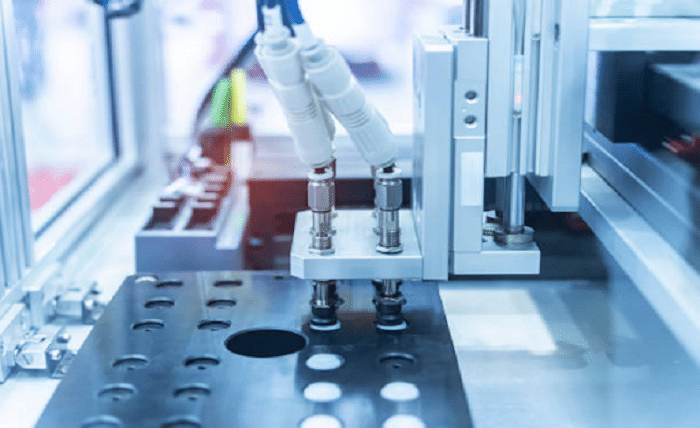What Makes an FRL Unit Essential for Your Pneumatic System?

Pneumatic systems are fundamental in powering different machines and tools across various industries. They utilize compressed air to perform tasks like lifting, moving, and assembling components. However, efficient and dependable pneumatic systems heavily depend on the quality of air. This is where FRL units filter, regulator, and lubricator systems come in. In this article, we will focus on FRL unit functions in pneumatic systems and why they are important for performance, life span and efficiency.
The Role of FRL Units in Pneumatic Systems
An FRL unit is a filter, regulator, and lubricator combination consisting of three parts that serve a singular function and ensure that compressed air has no contamination while being supplied to pneumatic systems. The filter element in the unit separates dirt and other contaminants such as water and oil out of the compressed air so that pneumatic parts do not get damaged. The regulator helps in controlling the air pressure to ensure that it does not exceed nor drop below a certain range to avoid fluctuations that might negatively impact the system. The lubricator increases the compressed air oil content to ensure that the moving parts within the system receive the lubrication that they need. Without doubt, none of these elements would be able to function to the same level of quality on their own as they do in conjunction with one another. The optimal performance of the pneumatic machine, as well as the reduction of wear and tear, is possible with all of its components working together. The integrity of the system is assured by the controlled quality of air, pressure, and lubrication. The equipment is guaranteed maximum output for longer time periods which lowers the chances of system maintenance and repairs within a short time period. Lastly, a primary advantage that comes with constant maintenance of an FRL unit is the elimination of role-efficient air flow – on the other hand, inadequate air flow burdens the system and increases energy usage.
Why One Should Consider Using FRL Units in Pneumatic Systems
FRL unit filters work seamlessly with industrial automation manufacturers’ systems. One key benefit of using FRL units is the filtering of compressed air to eliminate the dirt that causes damage to pneumatic systems. When there is no filter, dirt and moisture can seep into the pneumatic system, corroding and wearing down cylinders, valves, and actuators. Moreover, the FRL unit lubricator clears the air for internal moving components, reducing friction to boost the system’s life cycle. The FRL unit regulator also assists by maintaining suitable air pressure for normal operations of pneumatically powered equipment. Without the regulator, there will be pressure changes which lead to erratic movements of the machinery, reduced productivity, and worse, damage to the device. All of these advantages make the FRL extremely helpful in minimizing downtime while increasing the reliability of industrial automation systems. In short, the FRL units assure manufacturers that their pneumatic systems will work optimally, with a low rate of failures, ultimately cutting operational costs.
How FRL Units Improve System Efficiency and Longevity
FRL units are potent tools that improve the efficiency and longevity of a pneumatic system. With an FRL unit, a microscopic filter is incorporated to ensure the air reaching the system is free from any pollutants. This, in turn, minimizes the risk of clogging or components failing. It prevents harmful particles such as dust, dirt, and moisture from accumulating which makes the system ineffective and increases wear and tear. The regulator ensures that the system does not go beyond the set air pressure, making sure energy is not wasted. This improves the overall energy efficiency of the system. When a constant pressure is achieved, pneumatic equipment tools can perform their functions more efficiently which results in increased productivity and output. To the lubricator, oil is blended into the compressed air and the friction caused by moving components is suppressed. Reduced friction enables components to move freely and smoothly which also helps in making sure that they do not undergo excessive wear. Proper lubrication also ensures that parts operate with less resistance which can lower energy costs. An FRL unit helps to increase the lifespan of pneumatic components, lower the cost of maintenance, and significantly reduce the requirements for repairing the components by providing a clean, controlled, and lubricated air supply. Such lower the requirements which results in a system that is cost effective and increases the periods at which such tools would go without being used.
What Compressed Air Filter Manufacturers Bring To The Table Regarding FRL Units
Like every other unit, the FRL too relies on its components, and that applies more so to the filter. Compressed air filter manufacturers are crucial as they provide high quality filters that guard against air pollution in the pneumatic system. A good filter captures particles such as dust, moisture, and oil which can adversely affect the system. The filters used in various applications differ in grade because some have a specified particle size and some have greater than specified values for particulates. Industrial automation manufacturers often work with filters that meet a bore size specification, but it is also important to make sure that the filter does not compromise the quality of air entering the pneumatic system. The better filter lowers the volume of pollutants entering the system, which minimizes performance degradation and the likelihood of system breakdowns, and maximizes overall system functioning and equipment productivity. Other critical components of the pneumatic system along with high quality filters, and the right regulator and lubricator, make the FRL unit the most important part of such systems. In order to achieve the opposite and lessen wear and downtime, there has to be a certain level of filtration in place.
Conclusion
The air intake block, which comprises a filter, regulator, and lubricator (FRL Unit), is extremely critical to the performance, dependability, and durability of pneumatic systems. With the removal of contaminants, regulation of air pressure, and provision of lubrication, the FRL unit assures optimal operational conditions for pneumatic parts which consequently smoothens functionality, reduces the destruction of components, cuts downtime, and prolongs the system’s life. Industrial automation producers have to install FRL units to their systems for appropriate functionality of their systems and for reliable performance. There is also a significant contribution from the compressed air filter manufacturers in the market for the proper functioning of pneumatic systems; without the clean, regulated, and lubricated air the systems could not operate as efficiently. The enhancement of productivity, reduction of expenses for maintenance, and the improvement of the overall performance of the system offer a strong justification for the investment in FRL units. This makes them crucial components of modern industrial automation systems. In this way, the units enable the efficient operation of pneumatic systems, decreasing energy consumption and increasing the lifespan of the equipment, which results in greater return on investment and sustainability of operations.




